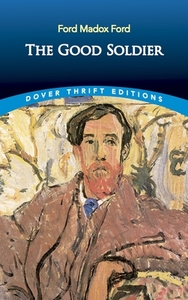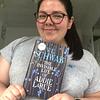Take a photo of a barcode or cover
This is Ford's take on literary impressionism, and the result is a brilliant exploration of characterization and an absolute must-read for anyone interested in narratology. Considered by many to be the first modernist novel, The Good Soldier acts as a bridge of sorts between the realism of writers like Henry James and the later brilliance of Virginia Woolf, James Joyce, and William Faulkner.
The Good Soldier is essentially what would happen if Jane Austen's parlour-room drama were met by the most duplicitous characters and a narrator who has a lot on the line by recording this story for us. Seriously, this takes the idea of an "unreliable narrator" and explodes it. John Dowell opens his narrative with the statement "This is the saddest story I have ever heard" - a bit of an odd sentiment considering he's relaying the story of his own life. This begins a lengthy process of Dowell trying to make himself as invisible, as much of a non-character as possible. The beauty and the frustration is that we never have another character's perspective, meaning we never know how much Dowell changes, exaggerates, or spins the narrative to his own advantage.
The novel's real trick is in making you realize, this is actually how every narrator works. After Ford, there is no objective narrative; every narrator chooses one focalization at the expense of another. The Good Soldier exposes the myth of objectivity with such simplicity (it's a little on the nose at times), and yet manages to be a complex and intriguing novel at the same time. This book not only is excellent in itself, the act of reading The Good Soldier teaches us how to read fiction as a whole. Truly one I'll be thinking about for years to come.
The Good Soldier is essentially what would happen if Jane Austen's parlour-room drama were met by the most duplicitous characters and a narrator who has a lot on the line by recording this story for us. Seriously, this takes the idea of an "unreliable narrator" and explodes it. John Dowell opens his narrative with the statement "This is the saddest story I have ever heard" - a bit of an odd sentiment considering he's relaying the story of his own life. This begins a lengthy process of Dowell trying to make himself as invisible, as much of a non-character as possible. The beauty and the frustration is that we never have another character's perspective, meaning we never know how much Dowell changes, exaggerates, or spins the narrative to his own advantage.
The novel's real trick is in making you realize, this is actually how every narrator works. After Ford, there is no objective narrative; every narrator chooses one focalization at the expense of another. The Good Soldier exposes the myth of objectivity with such simplicity (it's a little on the nose at times), and yet manages to be a complex and intriguing novel at the same time. This book not only is excellent in itself, the act of reading The Good Soldier teaches us how to read fiction as a whole. Truly one I'll be thinking about for years to come.
I've read this book a few times and it is one of my absolute favorites. The development of the relationship is so subtle, that you almost don't realized how attached you feel to it until it goes wrong and you feel like your gut has been ripped out. Absolute Classic Masterpiece.
challenging
emotional
reflective
slow-paced
Plot or Character Driven:
Character
Strong character development:
Yes
Loveable characters:
Yes
Diverse cast of characters:
No
Flaws of characters a main focus:
Yes
challenging
sad
slow-paced
Plot or Character Driven:
Character
Strong character development:
Complicated
Loveable characters:
No
Diverse cast of characters:
No
Flaws of characters a main focus:
Yes
Are you SURE you want to read this book?
1. He says these phrases way too much in his book: "I mean to say", "I don't mean to say", "At any rate". Drove me nuts.
2. He is all over the place time-wise in this book. Hard to keep track. He, the narrator, even admits it towards the end.
3. This should never have been this long of a story! Almost 240 pages?! Should have been 50 and it *might* have been a good short story.
4. I am not a Catholic, but if I were, I would be greatly insulted. Lots of Catholic bashing in this book. Also, he states anyone from the state of Maine or Northern England is pretty much stupid.
And lastly, do you remember your Aunt Roberta? Yes you do. You know, the one who talked to you on the phone for an hour and a half and you never got a word in edgewise? Yes, that one. Remember how you would finally put the phone down, walk away, come back an hour later and she was still talking like you never even left? Also, when you visited her, after two hours of her talking, she would go down to the basement to switch the laundry around, while you stayed upstairs, but she STILL talked to you the entire time, as if you could hear her (or care?). Well, her and Ford Madox Ford are twins, so if you never minded Aunt Roberta monopolizing all your time with nonsense, then this is the book for you!
1. He says these phrases way too much in his book: "I mean to say", "I don't mean to say", "At any rate". Drove me nuts.
2. He is all over the place time-wise in this book. Hard to keep track. He, the narrator, even admits it towards the end.
3. This should never have been this long of a story! Almost 240 pages?! Should have been 50 and it *might* have been a good short story.
4. I am not a Catholic, but if I were, I would be greatly insulted. Lots of Catholic bashing in this book. Also, he states anyone from the state of Maine or Northern England is pretty much stupid.
And lastly, do you remember your Aunt Roberta? Yes you do. You know, the one who talked to you on the phone for an hour and a half and you never got a word in edgewise? Yes, that one. Remember how you would finally put the phone down, walk away, come back an hour later and she was still talking like you never even left? Also, when you visited her, after two hours of her talking, she would go down to the basement to switch the laundry around, while you stayed upstairs, but she STILL talked to you the entire time, as if you could hear her (or care?). Well, her and Ford Madox Ford are twins, so if you never minded Aunt Roberta monopolizing all your time with nonsense, then this is the book for you!
The most frustrating book (and narrator). Don't willingly put yourself through this.
dark
emotional
reflective
sad
slow-paced
Plot or Character Driven:
Character
Strong character development:
No
Loveable characters:
No
Diverse cast of characters:
No
Flaws of characters a main focus:
Yes
while i can concede that this is a modernist masterpiece, it’s also a very depraved set of characters doing very depraved things in a depraved world. best understood in at least three rereads.
SPOILERS AHEAD
23/8 - I admit, I picked this book up because it's in the 1001 Books You Must Read Before You Die book and because I thought this book had something to do with WWI. I've read the first 20 pages so far and while I was reading it I kept expecting something war related to crop up. I have now been enlightened as to why nothing ever did crop up by the previous reviews for the book. While I was surprised by this, so far I'm not disappointed with the different plot. Check back later for further developments. To be continued...
25/8 - This is the second book I've read this week where the author insists on being mysterious about the locations he's (or she, as was the case with the previous book) writing about. What's with M_____ as a substitute to actually giving the name of a holiday destination that the characters were heading to. The book is fictional, if you don't want to use real location names make up a place (argghh).
Other than that small but highly irritating niggle I'm enjoying the book. At the moment it appears to be a slowly revealed mystery (perhaps murder) about two perfect couples, at least they are on the surface. One couple, John and Florence Dowell are British and the other, Edward and Leonora Ashburnham, are American. The two couples meet at some kind of spa for the treatment of heart problems (it's set in 1913/14). By the end of the book Edward and Florence are both dead and the narrator, John, is retelling the tale of how they got that way through his and Leonora's recollections. It was a little slow moving, but it became more interesting when we learned that Edward was a serial philanderer and that he and Florence were having an affair leading up to their deaths. To be continued...
3/9 - Goodness, I didn't realise how long it had been since I last added to this review. At about the spot where I was up to with the last review I got a bit bored of the constant misdirections and back and forth in time tangents that Ford sent the story on. He'd be going on in a normal linear time line and then some little point of a conversation or anecdote would send us back in time some months or years. I started getting confused as to what order the events in the 'present day' time line actually happened, he jumped back and forth so often. I can say that like with most good horror movies, almost everyone dies.
23/8 - I admit, I picked this book up because it's in the 1001 Books You Must Read Before You Die book and because I thought this book had something to do with WWI. I've read the first 20 pages so far and while I was reading it I kept expecting something war related to crop up. I have now been enlightened as to why nothing ever did crop up by the previous reviews for the book. While I was surprised by this, so far I'm not disappointed with the different plot. Check back later for further developments. To be continued...
25/8 - This is the second book I've read this week where the author insists on being mysterious about the locations he's (or she, as was the case with the previous book) writing about. What's with M_____ as a substitute to actually giving the name of a holiday destination that the characters were heading to. The book is fictional, if you don't want to use real location names make up a place (argghh).
Other than that small but highly irritating niggle I'm enjoying the book. At the moment it appears to be a slowly revealed mystery (perhaps murder) about two perfect couples, at least they are on the surface. One couple, John and Florence Dowell are British and the other, Edward and Leonora Ashburnham, are American. The two couples meet at some kind of spa for the treatment of heart problems (it's set in 1913/14). By the end of the book Edward and Florence are both dead and the narrator, John, is retelling the tale of how they got that way through his and Leonora's recollections. It was a little slow moving, but it became more interesting when we learned that Edward was a serial philanderer and that he and Florence were having an affair leading up to their deaths. To be continued...
3/9 - Goodness, I didn't realise how long it had been since I last added to this review. At about the spot where I was up to with the last review I got a bit bored of the constant misdirections and back and forth in time tangents that Ford sent the story on. He'd be going on in a normal linear time line and then some little point of a conversation or anecdote would send us back in time some months or years. I started getting confused as to what order the events in the 'present day' time line actually happened, he jumped back and forth so often. I can say that like with most good horror movies, almost everyone dies.
challenging
reflective
tense
slow-paced
One of my all-time favorite novels, since reading it in college decades ago. A masterpiece.




